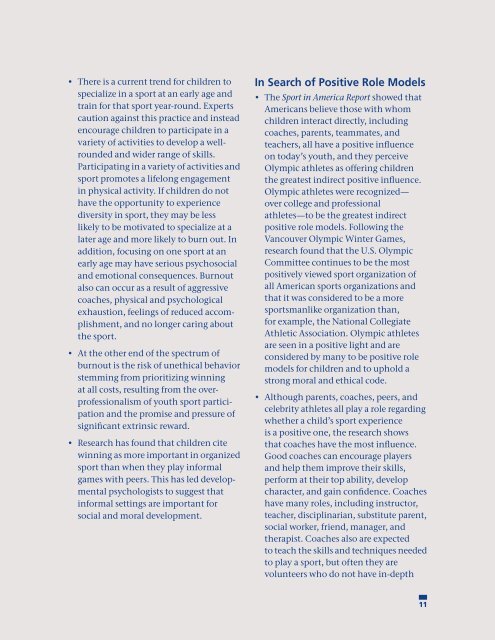True-Sport-Report
You also want an ePaper? Increase the reach of your titles
YUMPU automatically turns print PDFs into web optimized ePapers that Google loves.
• There is a current trend for children to<br />
specialize in a sport at an early age and<br />
train for that sport year-round. Experts<br />
caution against this practice and instead<br />
encourage children to participate in a<br />
variety of activities to develop a wellrounded<br />
and wider range of skills.<br />
Participating in a variety of activities and<br />
sport promotes a lifelong engagement<br />
in physical activity. If children do not<br />
have the opportunity to experience<br />
diversity in sport, they may be less<br />
likely to be motivated to specialize at a<br />
later age and more likely to burn out. In<br />
addition, focusing on one sport at an<br />
early age may have serious psychosocial<br />
and emotional consequences. Burnout<br />
also can occur as a result of aggressive<br />
coaches, physical and psychological<br />
exhaustion, feelings of reduced accomplishment,<br />
and no longer caring about<br />
the sport.<br />
• At the other end of the spectrum of<br />
burnout is the risk of unethical behavior<br />
stemming from prioritizing winning<br />
at all costs, resulting from the overprofessionalism<br />
of youth sport participation<br />
and the promise and pressure of<br />
significant extrinsic reward.<br />
• Research has found that children cite<br />
winning as more important in organized<br />
sport than when they play informal<br />
games with peers. This has led developmental<br />
psychologists to suggest that<br />
informal settings are important for<br />
social and moral development.<br />
In Search of Positive Role Models<br />
• The <strong>Sport</strong> in America <strong>Report</strong> showed that<br />
Americans believe those with whom<br />
children interact directly, including<br />
coaches, parents, teammates, and<br />
teachers, all have a positive influence<br />
on today’s youth, and they perceive<br />
Olympic athletes as offering children<br />
the greatest indirect positive influence.<br />
Olympic athletes were recognized—<br />
over college and professional<br />
athletes—to be the greatest indirect<br />
positive role models. Following the<br />
Vancouver Olympic Winter Games,<br />
research found that the U.S. Olympic<br />
Committee continues to be the most<br />
positively viewed sport organization of<br />
all American sports organizations and<br />
that it was considered to be a more<br />
sportsmanlike organization than,<br />
for example, the National Collegiate<br />
Athletic Association. Olympic athletes<br />
are seen in a positive light and are<br />
considered by many to be positive role<br />
models for children and to uphold a<br />
strong moral and ethical code.<br />
• Although parents, coaches, peers, and<br />
celebrity athletes all play a role regarding<br />
whether a child’s sport experience<br />
is a positive one, the research shows<br />
that coaches have the most influence.<br />
Good coaches can encourage players<br />
and help them improve their skills,<br />
perform at their top ability, develop<br />
character, and gain confidence. Coaches<br />
have many roles, including instructor,<br />
teacher, disciplinarian, substitute parent,<br />
social worker, friend, manager, and<br />
therapist. Coaches also are expected<br />
to teach the skills and techniques needed<br />
to play a sport, but often they are<br />
volunteers who do not have in-depth<br />
11


